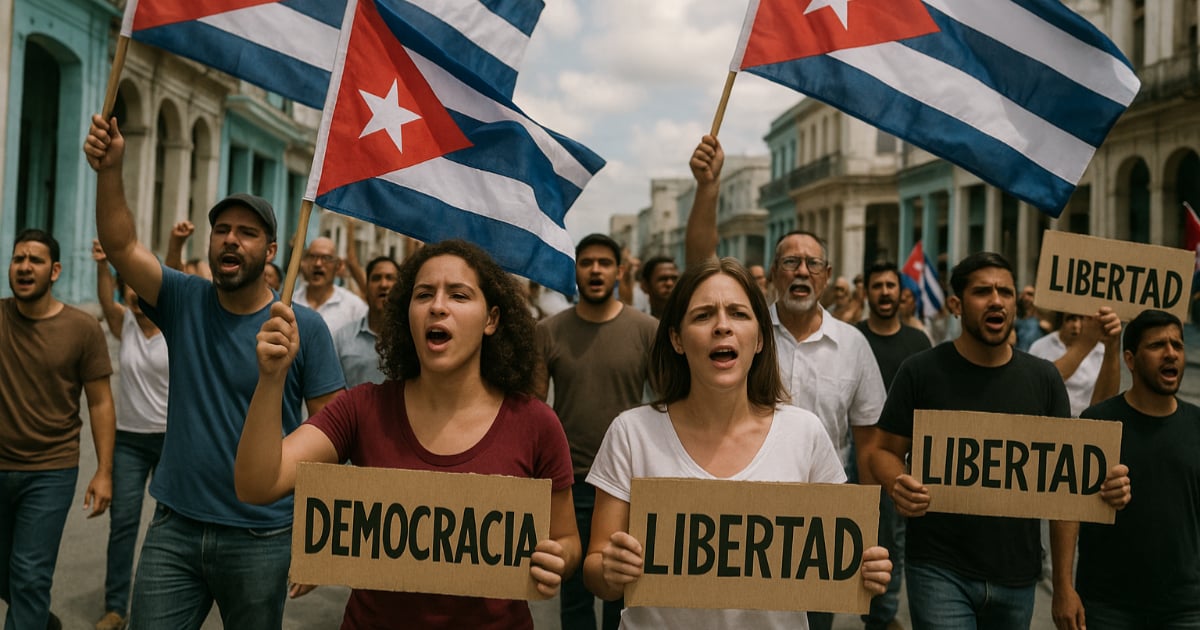Amid a rising wave of social discontent and public demonstrations across various regions of the island, the civic platform Pasos de Cambio unveiled a strategic, peaceful, and inclusive roadmap this Wednesday, aiming to pave the way for a democratic transition in Cuba. Titled "Guidelines for Citizen Mobilization for Change in Cuba," the document gathers key proposals from Cuban citizens and organizations both inside and outside the country, following an open call that concluded on April 21.
With a foundation of unity and non-violent action, the guidelines aim to create a national movement capable of dismantling the current political system and establishing a democracy with full civil, political, and economic guarantees. The proposals align around five essential strategic lines centered on peaceful mobilization, citizen organization, international pressure, and support for independent media.
Building a National Movement for Change
Peaceful Mobilization and Civil Disobedience: The initiative promotes the use of tools such as public protests, banging pots (cacerolazos), boycotts, sit-ins, student strikes, and citizen information campaigns. These actions are designed to highlight social discontent and undermine the regime’s legitimacy, while maintaining a strictly non-violent nature.
Coordinated International Pressure
The platform suggests engaging the international community through denunciation campaigns, documentation of human rights violations, and diplomatic efforts with governments and multilateral organizations. This coordinated pressure is seen as crucial to the success of the democratic transition.
Supporting Independent Media and Free Economy
The document underscores the urgency of breaking the state’s monopoly over the media and promoting free internet access. It also highlights the importance of fostering genuinely independent economic enterprises as a means of empowering citizens.
Local and National Citizen Organization
The importance of establishing coordination networks within Cuba, even under clandestine conditions, is emphasized. These networks are expected to plan and execute resistance actions, with logistical support and awareness provided by the Cuban diaspora.
Roadmap to Political Change
The plan for a democratic transition is outlined in five stages: immediate respect for fundamental rights, release of political prisoners, and an end to repression; resignation of regime leaders and formation of an independent electoral committee; conduct of a binding plebiscite; installation of a transitional government, and holding of free, plural elections with international observation.
This initiative is part of the campaign "Your Voice Counts in the Cuban Democratic Transition," launched in April by Pasos de Cambio, aiming to gather concrete proposals from Cubans at home and abroad. "We come together beyond our individual strategies, aware of the need for a profound change in our country's political, social, and economic structures," the platform stated at the time.
The collected proposals range from immediate actions to long-term structural transformations and have been published in full on the initiative's official site. The proponents of this initiative seek to create an inclusive and plural roadmap for Cuba's transition, at a time when civic and student protests are gaining momentum on the island.
Common Questions About Cuba's Democratic Transition
What is the main goal of the "Guidelines for Citizen Mobilization for Change in Cuba"?
The primary objective is to establish a strategic, peaceful, and inclusive movement to transition Cuba towards a democracy with full civil, political, and economic rights.
How does the initiative propose to apply international pressure?
It plans to engage the international community through denunciation campaigns, documentation of human rights abuses, and diplomatic efforts with governments and multilateral entities.
What are some of the methods suggested for peaceful mobilization?
Suggested methods include public protests, banging pots (cacerolazos), boycotts, sit-ins, student strikes, and citizen information campaigns.
What role does the Cuban diaspora play in this initiative?
The Cuban diaspora is expected to provide logistical support and raise awareness for the coordination networks planning and executing resistance actions within Cuba.
